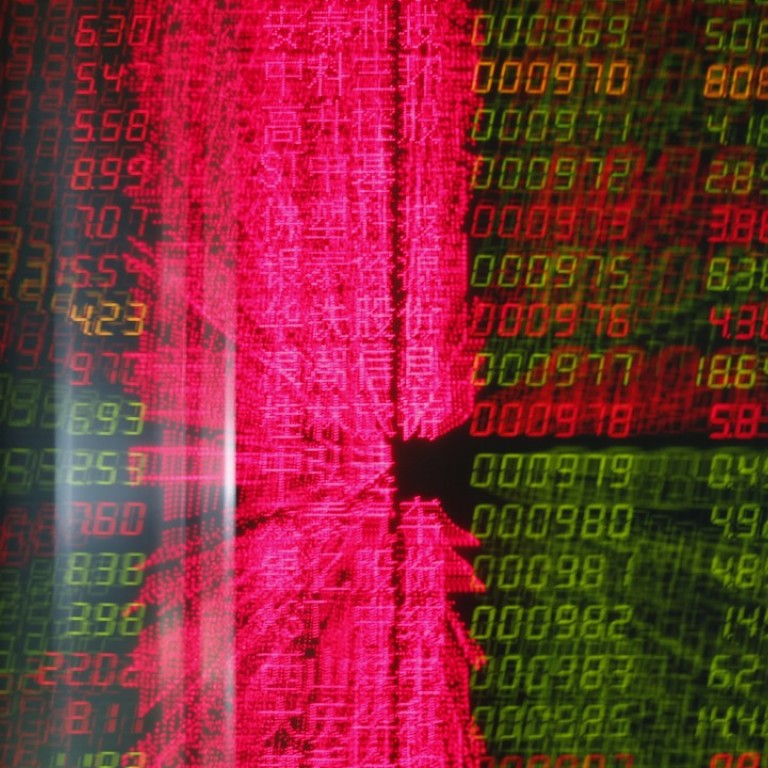
Huawei arrest weighs on China, Hong Kong stocks as Beijing summons US, Canadian envoys
- Investors worry about the impact of the arrest of Meng Wanzhou, chief financial officer of Huawei, on trade war truce
- Investors also take note of new China data showing weak domestic and overseas demand
Hong Kong stocks slid to a three-week low and Chinese equities also retreated on concern the US-China tensions will escalate over the detention of an executive at Huawei Technologies and as the release of initial economic data foreshadows further moderation in China’s growth.
The benchmark Hang Seng Index declined 1.2 per cent, or 311.38 points, to 25,752.38 on Monday, the lowest close since November 14. The Hang Seng China Enterprises Index fell 0.9 per cent. In the mainland, the Shanghai Composite Index shed 0.8 per cent, or 21.31 points, to 2,584.58. Markets elsewhere in Asia also headed south, with benchmarks in Japan and Australia sinking at least 1.9 per cent.
A sell-off on Chinese pharmaceutical stocks continued, wiping out 106.3 billion yuan (US$15.4 billion) in market capitalisation over the past three days, as an official government statement said over the weekend that a new centralised procurement process for generic drugs has slashed prices on average by 52 per cent from last year.
Beijing over the weekend summoned the US and Canadian ambassadors to China to protest against the arrest of Sabrian Meng Wanzhou, chief financial officer of Huawei, who is accused of violating US sanctions by selling equipment to Iran.
Meanwhile, China’s preliminary key November data pointed to a slowdown in the world’s second-largest economy. Growth in overseas shipments fell to an eight-month low of 5.4 per cent, while gains in producer prices weakened to 2.7 per cent for a fifth straight month of deceleration.
“The diplomatic tension has added to the cautious sentiment already in the market because of the 90-day truce [struck between President Xi Jinping and his US counterpart President Donald Trump],” said Louis Tse Ming-kwong, managing director of Hong Kong brokerage VC Asset Management.
In Hong Kong, developers topped the biggest decliners as the housing market was battered by a slew of weak sales data. China Resources Land slid 3.9 per cent to HK$28.10 and Hang Lung Properties lost 3.4 per cent to HK$15.16.
Companies with dual-class share structures also retreated even after the city’s exchange reached an agreement with the Shanghai and Shenzhen bourses to add the stocks with weighted voting rights to the exchange link starting next year. Xiaomi shed 2.6 per cent to HK$13.28 and Meituan Dianping sank 3.6 per cent to HK$52.05.
A gauge of health care companies on the CSI 300 Index slumped 1.9 per cent on Monday, capping a three day, 10 per cent loss, as investors rushed to exit the sector on jitters that the new procurement mechanism will crimp profitability. Among them, Shanghai RAAS Blood Products tumbled by the 10 per cent daily limit for a second day to 15.81 yuan and Lepu Medical Technology Beijing also slumped by the daily limit to 24.19 yuan. Huadong Medicine plunged 7.4 per cent to 27.66 yuan.
Investors may shift to infrastructure stocks from drug makers as the government ramps up investment to counter slowing growth, according to Citic Securities. Infrastructure investment may grow between 2 and 7 per cent in 2019 from a decline of 4 per cent this year, the brokerage said.


